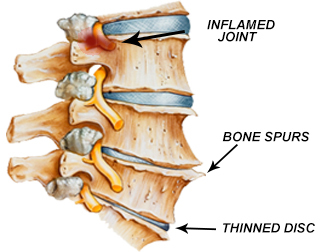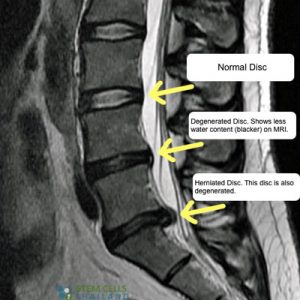“Degenerative disc disease”, “disc bulge”, “osteoarthritis”. These are some of the common diagnoses that many people see all over their MRI or x-ray reports. While these diagnoses might sound scary (and, unfortunately, are often used to sell patients expensive treatment plans), most of the time these signs aren’t the reason that you’re experiencing low back pain. So called “spinal degeneration”, more often than not, is a sign of normal aging and not a sign of disease or a significant marker of pain. It’s so common that up to ½ of healthy adults in their 20’s have these signs of degeneration, and are not experiencing pain.

With increasing use of imaging technology, we see the diagnosis of “disc degeneration”, “disc height loss”, “disc bulges”, and “facet degeneration” becoming more common. Research on these imaging results have time and time again shown very poor correlation with pain in the low back. Research conducted on healthy people of all ages with no history of back pain, found that these changes in the spine are very common and are normal signs of aging in the spine. All of the subjects in this experiment had MRIs of their low back and the findings were recorded.
 Rates of common diagnoses in this group with no back pain are:
Rates of common diagnoses in this group with no back pain are:
Disc degeneration 37% age 20s, 68% age 40s; 96% age 80s
Disc signal loss – 54% age 40s; 86% age 60s; 97% age 80s
Disc height loss – 24% age 20s; 45% age 40s; 67% age 60; 84% age 80s
Disc bulge – 30% age 20s; 50% age 40s; 69% age 60s; 84% age 80s
Disc protrusion – 29% age 20s; 33% age 40s; 38% age 60s; 43% age 80s
Annular fissures – 19% age 20s; 22% age 40s; 25% age 60s; 29% age 80s
Facet degeneration – 4% age 20s; 18% age 40s; 60% age 60s; 83% age 80s
Spondylolisthesis – 3% age 20s; 8% age 40s; 23% age 60s; 50% age 80s
Remember that all of these people do not have any history of back pain! All of these findings on your imaging are more likely part of the normal aging process rather than the reason your low back is always aching. Low back researcher Stuart McGill remarks that “a degenerative disc disease diagnosis is the equivalent of telling your mother-in-law with wrinkles that she has degenerative face disease!”
A very severe case of degenerative face disease
While there are many reasons to get advanced imaging of your spine, you have to take the findings with a grain of salt. There are people in severe pain with no findings on imaging, and there are people with no pain with severe degenerative findings on their imaging. The symptoms need to correlate with findings on your health history and physical examination. If serious signs arise on the examination (known as red flags), advanced imaging such as CT or MRI can be a the proper next step. A proper health history and physical examination from your chiropractor or health care provider is essential.
What does this mean for you? It’s probably good news! Having signs of degeneration on your x-rays or MRIs doesn’t mean that you will not respond to conservative treatments such as chiropractic care. Most likely the treatments offered by your chiropractor such as spinal manipulation and progressive rehab exercises are exactly what you need to get feeling better and get back to doing what you love.
What can you do with spinal degeneration?
-
You do not have to be afraid of moving and exercising.
-
You can live a full, active, and healthy life even with signs of spinal degeneration.
-
Find the right health care provider that will treat how you move and function, not treat your scary imaging results.
We pride ourselves at Function Performance Sport Chiropractic in giving authentic and effective care. We will work with you to find out what your individual goals are and work together to accomplish them!
REFERENCES:
Brinjikji, W., Luetmer, P. H., Comstock, B., Bresnahan, B. W., Chen, L. E., Deyo, R. A., … Jarvik, J. G. (2015). Systematic literature review of imaging features of spinal degeneration in asymptomatic populations. American Journal of Neuroradiology, 36(4), 811–816. http://doi.org/10.3174/ajnr.A4173



